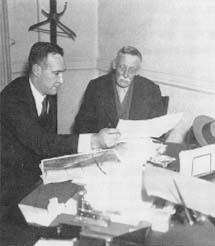Albert Fish Trial: 1935
The M'naghten Rule
Ever since Daniel M'Naghten, a deranged workman, was acquitted of an 1843 murder in London by reason of insanity, the so-called "M'Naghten Rule" had been the benchmark of sanity in the American courtroom. It reads as follows:
To establish a defense on the ground of insanity, it must be clearly proved that, at the time of the committing of the act, the party was laboring under such a defect of reason, from disease of the mind, as to not know the nature and quality of the act he was doing, or, if he did know it, that he did not know he was doing what was wrong.
 Albert Fish, selfproclaimed murderer/cannibalist, with his lawyer, James Demsey.
Albert Fish, selfproclaimed murderer/cannibalist, with his lawyer, James Demsey.
Gallagher was emphatic: "In this case, there is a presumption of sanity. The proof, briefly, will be that this defendant… knows the difference between right and wrong… and that he is legally sane and should answer for his acts."
For chief defense attorney James Dempsey, it was a question of getting as much of Fish's bizarre personal history before the jury as he dared. His was a life given over to wholesale perversion: self-flagellation with nail-studded paddles; needles plunged beneath his fingernails; unspeakable violence toward countless children; all fanned by delusions of religious mania. In 1930 he had been committed to Bellevue, New York's psychiatric hospital, only for them to discharge him as "fit to live in society."
"Bellevue has a lot to account for here," said Dempsey, reminding the jury that it was up to the prosecution to prove that a man who killed and ate children was sane.
Of the four psychiatrists who testified on behalf of the state, Dr. Charles Lambert was the most forceful in his insistence that Fish was a "psychopathic personality without a psychosis."
Dempsey stared incredulously at the witness. "Assume that this man not only killed this girl but took her flesh to eat it. Will you state that that man could for nine days eat that flesh and still not have a psychosis?"
"Well, there is no accounting for taste, Mr. Dempsey," replied Lambert smoothly.
Few in court were prepared for the stomach-churning testimony of the star defense witness, Dr. Frederic Wertham, an eminent psychiatrist who had examined Fish at length and would later write voluminously about the defendant. Certainly it was too strong for Judge Frederick Close, who at the outset had announced his intention of having "a quiet orderly trial." He ordered the courtroom cleared of women before permitting Wertham to recount extraordinary details gleaned from Fish's memory. So outlandish did they seem, that at first Wertham had wondered if what Fish told him "might be fancies, but I have never seen fancies which showed up on an X-ray." This was an X-ray of Fish which revealed no fewer than 29 needles embedded deep in his scrotal region.
Additional topics
Law Library - American Law and Legal InformationNotable Trials and Court Cases - 1918 to 1940Albert Fish Trial: 1935 - The M'naghten Rule, Admits To Cannibalism